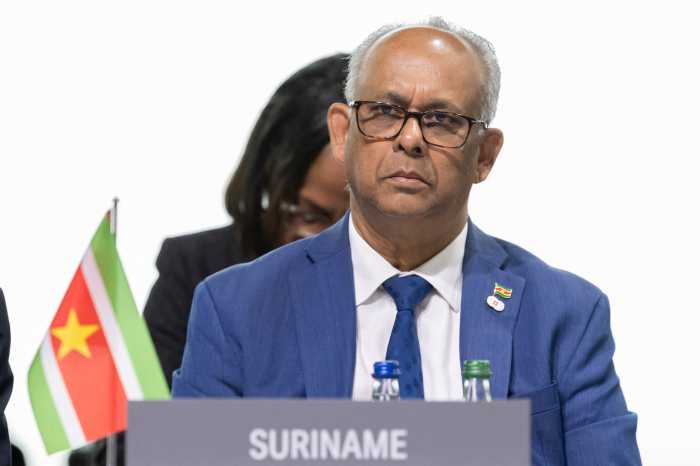With the week-long 76th Session of the United Nations General Assembly Debate concluding on Monday, Caribbean Community (CARICOM) Heads of Government and Foreign Affairs Ministers ensured their voices were well heard, as they lamented the dire, adverse effects of the COVID-19 pandemic on their respective economies.
They, unequivocally, capitalized on this year’s General Assembly theme, “Building resilience through hope — to recover from COVID-19, rebuild sustainably, respond to the needs of the planet, respect the rights of people, and revitalize the United Nations.”
Jamaica Prime Minister, Andrew Holness said the COVID-19 pandemic has exacerbated challenges in restoring the health and well-being of citizens, especially for Small Island Developing States (SIDS), like his own, which already face limited resources in the health sector.
“Most regrettably, many lives have been lost and we extend condolences,” he said. “There are increasing uncertainties as the pandemic continues and new variants emerge.”
The Jamaican leader said while mitigation efforts to help to reduce transmission and mortality remain crucial, the long-term solution must be vaccines that are accessible to all.
“We know that vaccines only work if a critical threshold is attained,” he said. “Sharing vaccines in a strategic manner serves the global common good, as no country will be safe until all are safe.”
He said Jamaica supports a globally coordinated approach to the scaling up of production and equitable distribution of vaccines, “with the United Nations at the core.”
“We welcome the support received from bilateral and international partners and through the COVAX Facility,” said the prime minister, stating that COVAX was conceived as “an expression of multilateralism, bringing widespread aspirations of hope in the collective approach.
“To date, however, it has not met expectations, as its noble ideals have been displaced by nationalistic endeavors, ironically, at a time when a pandemic requires global coordinated action,” he lamented. “Notwithstanding, we believe in the essential merits of the facility and call for urgent, increased international collaboration to avoid the widening gap in recovery across countries and regions.”
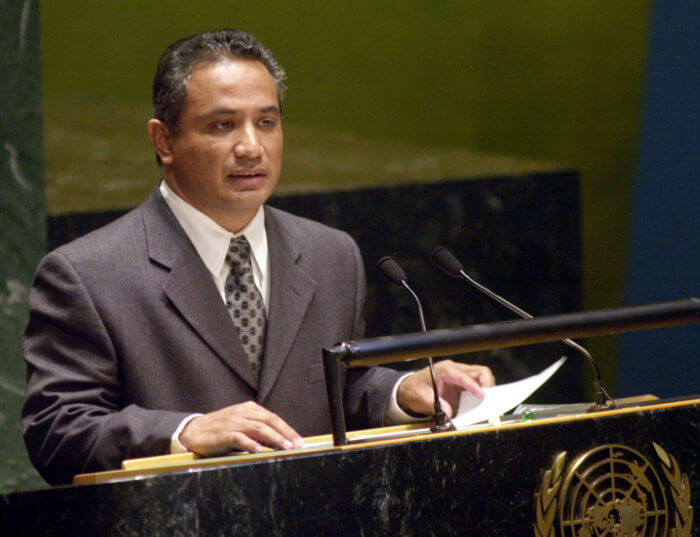
Belize Prime Minister John Briceño declared that the COVID-19 pandemic has brought the Belizean economy to its “knees”.
In his maiden address to the United Nations General Assembly, Briceño told the 76th Session Debate that his country’s unemployment rate has reached 30 percent, “as thousands of Belizeans lost their jobs.”
He said the gross domestic product (GDP) declined by 14 percent, the debt has “ballooned to 130 percent of GDP,” and that “many businesses were shuttered, the poverty rate increased to 60 percent, (and) “the impact of the pandemic has been swift, dramatic and devastating.”
The Belize prime minister said the human toll has been “deadly,” disclosing that already 399 Belizeans have lost their lives to COVID-19.
“We have a fatality rate of 2.05 percent,” he said. “Thousands have been hospitalized so far. “Our health facilities are overwhelmed as they were unprepared for the surge in admission of critical patients.”
Stating that the past 18 months have challenged everyone, St. Kitts and Nevis Prime Minister Dr. Timothy Harris warned that the battle against the COVID-19 pandemic is still very far from being over.
“The battle against COVID-19 is not yet won, and its devastating impact on our societies and economies continues,” said Dr. Harris. “We believe strongly that no one is safe until everyone is safe, that requires equitable access to vaccines and other medical products and technologies.”
He lamented that the economic impact of the pandemic will be felt for years to come.
“The impact of COVID-19 on development more widely, in particular the 2030 Sustainable Development Goals, has also been significant,” he added.
St. Lucia Prime Minister, Philip J. Pierre said while the novelty and evolving character of the COVID-19 pandemic are baffling, it has enlarged and worsened the issues confronting SIDS.
“We continue to contend with the near-impossible balancing act of preserving lives and livelihoods,” said Prime Minister Pierre in his maiden address to the 76th Session of the United Nations General Assembly Debate. “The insidious nature of the virus has allowed it to sneak across even the most heavily patrolled borders, and St. Lucia has experienced waves of highs and lows in managing this pandemic.”
He called for standardization of vaccine privileges across the global community, “as it relates to quarantine, isolation and other related requirements.”
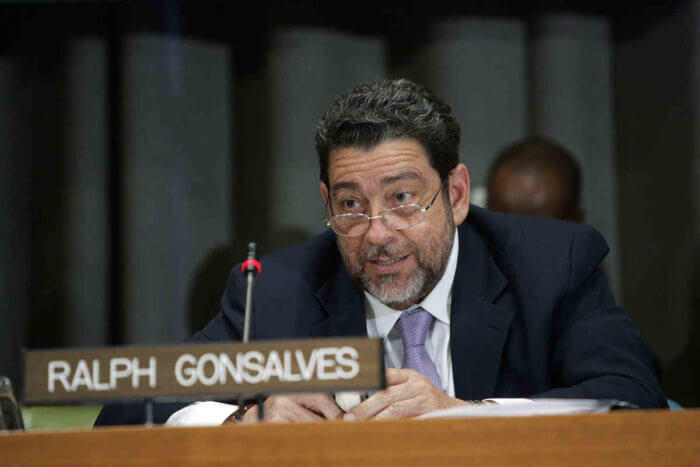
St. Vincent and the Grenadines Prime Minister, Dr. Ralph E. Gonsalves said the raging pandemic of COVID-19 has put the world in a “veritable tailspin, even as the roll-out of the vaccines has eased the strain somewhat, particularly in the developed world.”
“The COVID-19 pandemic has put the global community at the critical, proverbial crossroads. What is to be done? In tackling the pandemic itself, the old ways have tended to predominate, even as the sunlit rays of a possible new path have emerged,” Dr. Gonsalves said. “Thus, for example, globally, we have witnessed unacceptable vaccine nationalism; the politicization of the roll-out of the vaccines; and the roll-out of vaccines for the rich first and the poor afterwards. To be sure, we have also witnessed notable, and noble, work by some global institutions such as the World Health Organization, the World Bank, and the COVAX Facility, to make vaccines more accessible to poor or marginalized countries.”
The Vincentian prime minister said “the pervasive inequalities that defined the pre-COVID political and socioeconomic order must not become tomorrow’s nightmarish reality.
“Instead, in this COVID era, we must re-organize ourselves, locally, regionally, nationally and globally, in a quest to provide peace, security and development to all countries and peoples in novel ways and with fresh initiatives,” he urged. “And let us also, with a renewed sense of urgency and compassion, strive to protect, and improve upon, this planet that we all call home. It is pellucid that of all time, only the future is ours to desecrate. Our United Nations ought never to be accomplices in any such desecration.”
In agreeing with United Nations Secretary-General ,Antonio Guterres, Antigua and Barbuda Prime Minister Gaston Browne said the lack of a global response and vaccination program to end the COVID-19 pandemic is “a clear and tragic example” of the failure of the international community to deliver policies to support peace, global health, the viability of the planet and other pressing needs.
“If developed countries had acted in a manner that allowed for the proper access to vaccines and medical supplies at the onset of the pandemic, globally we would be in a better place,” Browne said. “Developing countries were not seeking handouts. Many of our countries paid into a global system that promised early access to vaccines.
“But it could not deliver because the majority of the vaccines from the major pharmaceutical companies had been bought or contracted and hoarded by a few wealthy nations, leaving the rest of the world bereft of the means to save their people,” he added. “This selfish nationalism forced most nations to rely on vaccine charity which, in itself, has not solved the problem of large numbers of people remaining unvaccinated throughout the world.
“No country wanted charity; no country wanted to beg for vaccines that should be a global good accessible to all,” Browne continued. “We were ready to pay. “But the vaccines were hoarded, and the pharmaceutical companies demanded prices beyond the capacity of countries whose economies were already decimated by the economic effects of the pandemic.”
The Antiguan leader said the world “should not witness such a spectacle again.
“What is significant about the COVID-19 pandemic is that years of warnings of an inevitable pandemic threat were not addressed, and there was inadequate funding and stress testing of preparedness,” he said.
The Bahamas Prime Minister Phillip Edward Davis called for equitable distribution of COVID-19 vaccines, including to SIDS, which are not manufacturers.
“It is also important to make safe treatments and therapeutics accessible and to designate them as public goods,” said Davis in his maiden address to the United Nations General Assembly Debate.
“The COVID-19 pandemic has made abundantly clear what many of us have always known to be true: we are all in this together,” he told the Assembly in his in-person address to the 76th Session.
“We must collaborate to end the COVID-19 pandemic and address public health issues,” Davis added. “We must cooperate to mitigate the effects of climate change. Access to development financing must be adequate and fair. Lagging response on any of these issues will have dire consequences for the global economy.”
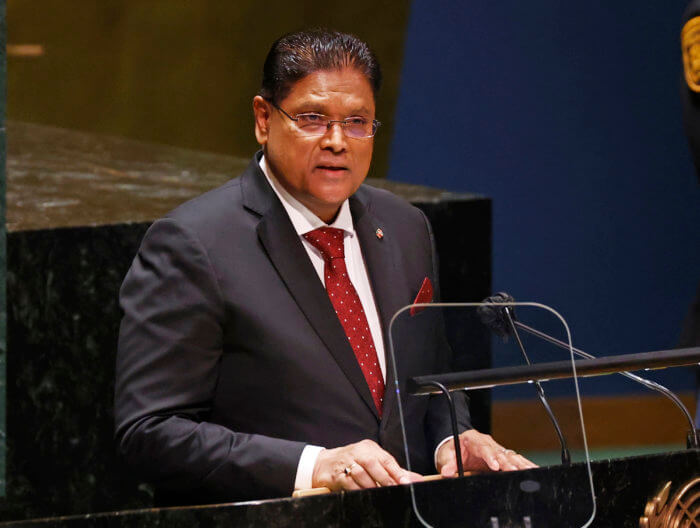
In his maiden address to the UN General Assembly, Suriname President, Chandrikapersad Santokhi said the COVID-19 pandemic has “clearly highlighted, that when in crisis, seemingly international solidarity, has little, or no meaning.”
He called for a post COVID-strategy, with a focus on, among other things, “developing an effective strategy to improve vaccination levels in our societies” and establishing a COVID 19 recovery fund, with support of the international financial institutions and the private sector.
Guyana President Dr. Mohamed Irfaan Ali said: “The peoples of our planet are living under a cloud of uncertainty.
“COVID-19 has stomped across the globe, taking lives, wrecking livelihoods and paralyzing economies,” he said in his maiden UN General Assembly address. “The pandemic has demonstrated our collective failure to come together and make joint decisions for the common good, even in the face of an immediate, life-threatening global emergency.
“The pandemic has exposed the shortcomings of our international system,” he added. “It has revealed that the system continues to be undergirded by nationalism which remains the prevailing force.
“While poor and vulnerable countries will suffer longer, and more intensely from the impact of the COVID-19 pandemic, rich countries have not been spared,” Ali continued. “Those, who at the advent of the pandemic concentrated on making themselves secure, now understand they will not be safe until we are all safe, because the virus knows not – and cares not – about race, ethnicity, age or gender.”
Trinidad and Tobago said the COVID-19 pandemic has laid bare the “profound fragilities of our interconnected societies and economies.”
“None among us have escaped severe economic contraction and consequential loss of livelihoods,” said Sen. Dr. Amery Browne, Minister of Foreign and CARICOM Affairs. “Most of all, the heavy death toll has created new and complex social issues in our societies that require intervention by governments. We are of the firm belief that multilateralism is the only vehicle by which we can jointly save humanity, safeguard livelihoods, and reenergize our economies.
“It is happening right before our very eyes; COVID-19 has now become a pandemic of the unvaccinated, the majority of whom live in the Global South,” Dr. Browne added. “As a responsible community of nations, we ought to take immediate measures to ensure equitable access to and distribution of vaccines across this globe. This would be the only secure way to protect our populations from further demise and our economies from further convulsions, as the current situation of vaccine inequity benefits only the virus.”
Dominica’s Minister for Foreign Affairs, Dr. Kenneth Darroux said his government has had to redirect scarce resources to combat the surge in COVID-19 cases, while increasing investment in primary health care services.
“We are fully aware, however, that there are still several countries with limited or no access to COVID-19 vaccines, and we call on member states and the International Community by extension, to acknowledge the importance of Resolution 74/274, adopted by the United Nations General Assembly, which calls for the strengthening of supply chains that promote and ensure universal, fair, inclusive, transparent, equitable, efficient and timely access to medicines, vaccines and other health supplies in order to address the COVID-19 pandemic,” he said.
“Dominica firmly supports the view that vaccines are a public good and that no one is safe until everyone is safe,” he added. “Science has proven that vaccines are an important way out of this pandemic, and a coordinated response to COVID-19 is not possible without an open and supportive multilateral system.”
Grenada’s Minister of Foreign Affairs, Oliver Joseph said his island continued to “grapple with COVID-19, its death toll, the negative impact on our economies, the social fallouts, and the inequitable access to vaccines, particularly for small island developing states like Grenada, all of which undermine the stability and survival of our peoples.
“COVID-19 has indeed wreaked immense havoc on economies across the world, but with a particular intensity and lasting effect on small economies such as ours,” he said, stating that prior to the first case of COVID-19 on the island in March 2020, the Grenadian economy was on an upward trajectory since 2013, growing at an average rate of 4.5 per cent per year.
Joseph said the socio-economic fallout from the pandemic has been especially severe for vulnerable groups, particularly women, youth and the unskilled, “who are overrepresented in the tourism and informal sectors, which were hardest hit by the pandemic.”
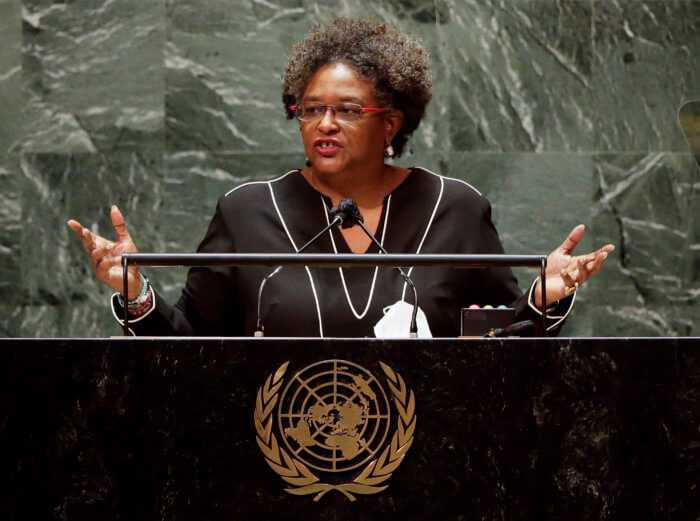
Barbados Prime Minister, Mia Mottley sought answers for several questions from the international community, ranging from climate change to a new world order that would allow for the global community to shape its own future destiny.
“I am not here to say I told you so,” she said. “But I will say that we must move the needle! We must lead and we must act.
“How many variants of COVID-19 must arrive, before a worldwide vaccination plan is implemented? How many deaths must it take, before 1.7 billion excess vaccines are shared?” she asked.
“If we do not control this fire, it will burn us all down,” Mottley warned. “As I said two years ago …now is the time for leadership.”
She called on the international community and people of the world to “indicate the direction that we must go in to save our planet and to save our people.”


